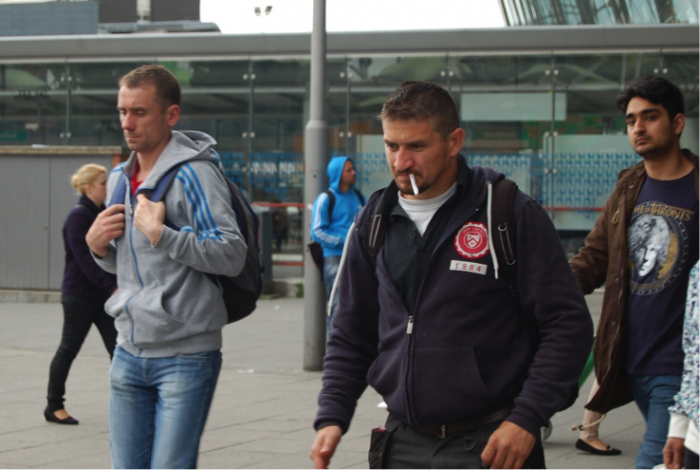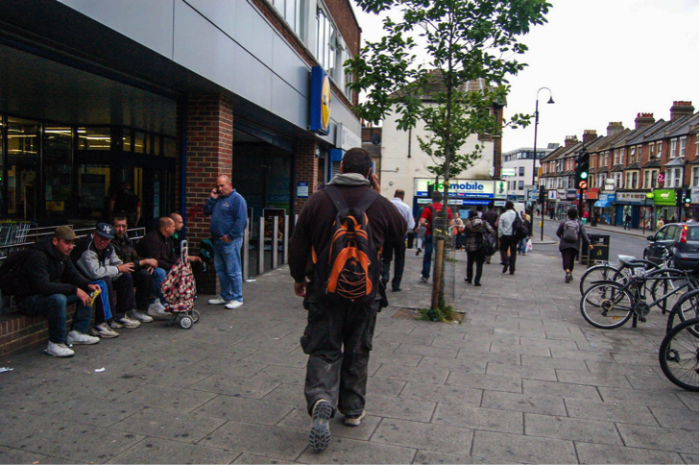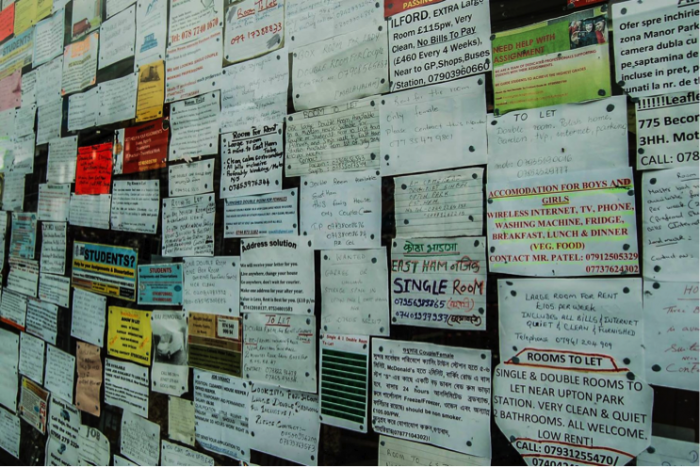Bulgarians on their way to the “West”
EU immigration was the primary source of contention in the debates surrounding the recent referendum about the United Kingdom’s EU membership. The “leave” campaign continuously bombarded the public with warnings about “uncontrollable hordes” of EU benefit seekers (for a discussion on the construction of migrant categories, see Apostolova 2016) planning to permanently settle for the “easy” life in the UK and take away the jobs of the locals. Likewise, the “remain” campaign promised to crack down on the number of immigrants and further restrict the rights of newcomers. In this way, both camps reinforced the perception that immigration from the EU, and in particular from eastern Europe, is a problem. Furthermore, in their effort to make the case for a “remain” scenario, academic voices tirelessly demonstrated the economic, cultural, and demographic benefits of EU migration. Such efforts, however well intended, still feed into an instrumentalist policy perspective that constructs migrants’ lives as only important in terms of their added value for the local economy.
This blog post will attempt to shift the debate away from the macroeconomic and biopolitical framing prevalent in both policy and academic discourses by providing insight into the early-stage migration experiences of Bulgarian workers in the UK. First, I will show how the structural violence and discrimination that Bulgarian labor migrants are met with in British society limits them to employment in the shadow economy and a precarious existence at the margins of British society. I will further point out how many migrants blame themselves for their own failure and perceive their position within society as inferior, all of which diminishes their possibilities of social mobility and gives rise to rivalry and exploitation within the migrant community. I further argue that contemporary Bulgarian migration to the UK can be explained by the ideological attraction of an “imaginary West”—an idealized projection of a better future in industrialized western countries.
EU citizens, not migrants!
When I first began recruiting informants for my project on Bulgarian migration to the UK in the summer of 2013, I turned to an online Bulgarian forum for current and prospective migrants. My search for “people who plan to migrate in the near future” was met with indignation. Forum users questioned my identity and intentions: some suspected I was gathering personal information on would-be migrants in order to obstruct their movements; others went as far as to assume I was a criminal trying to lure victims under a stolen identity. Most importantly, however, those planning to start their new lives in the UK assured me that my search for Bulgarian migrants would leave me empty-handed as all I would find in the forum were “free-moving Europeans.”
Such encounters opened my eyes to the denigrating meaning that the term “migrant” had acquired for Bulgarians wishing to escape their troubled present. To challenge and break away from this stigma, they emphasized their Europeanness and the dignified and privileged position that European citizenship denoted—at least according to the political discourse of European integration and the legal definitions. As I learned more through my fieldwork, however, shortly upon arrival in the UK, most Bulgarians’ expectations of Western life were not met. They came to realize that while movement was free, legal and stable employment was hard to find. In fact, it remains a privilege one needs to fight for even years after arrival.
The “illegal” EU migrants
Many of my informants postponed their journeys to the beginning of 2014, assuming that the UK government’s lifting of work restrictions for Bulgarians and Romanians would increase their opportunities of finding stable employment. As they quickly came to realize, however, the process of obtaining the mandatory documentation proved far from straightforward and presented them with almost insurmountable bureaucratic obstacles. Any legal employment required one to obtain a National Insurance number (NINo) and a bank account. For most of my informants, the NINo interview, imagined as a “tickbox” exercise, turned into a traumatic first encounter with British institutions. The right to use an interpreter during the interview was denied to many of those I spoke to, and they were often scolded for not speaking English and discouraged from applying for welfare support. The weeks—in some cases months—after the interview were marked by apprehension and insecurity as they waited for the decision that would determine their future socioeconomic mobility. In some cases the NI number was granted only after months of unjustified rejections and painstaking reapplications.
For many, the bank account proved to be the real challenge. Along with other documentation, most banks require one or more proofs of address for creating an account. Although much depends on the specific bank and the employee, common options include a maintenance bill in one’s name, a tenancy agreement, or a NINo. These were unattainable for many Bulgarians. Migrants often stayed with friends or rented a room with unregistered landlords—legal renting is expensive and requires references and background checks. Even those who managed to provide all of the necessary documents were often denied a bank account. After receiving consecutive rejections, despite having all of the necessary documents and literally begging banks for cooperation, many of those I spoke to found themselves forced to use the paid services of fellow Bulgarians who promise to issue a bank account within less than a day.
While waiting to obtain their documents, many Bulgarians became easy prey for fraudulent agencies. British and Bulgarian employers and gang leaders often tricked them into exploitative and informal cash-in-hand jobs in construction, car washing, leaflet distribution, and cleaning. Such jobs usually pay between £35 and £40 for a ten- to twelve-hour workday—less than half of the national minimum wage. Many depended on Bulgarian landlords who provided poor quality and overcrowded accommodation with no tenancy agreements, eager to cash out on the vulnerability of their compatriots. This combination of unexpectedly high cost of living and low earnings meant that migrants could survive but were unable to repay debts incurred before migrating, to remit money back home, or to save enough to bring over their families. Thus, initial plans for permanent settlement often turned out to be unfeasible, and the only possibility to generate surplus income became circular migration: in order to avoid long and costly periods of unemployment while in the UK, short stays in Bulgaria were used to secure jobs and living arrangements in advance.
While Bulgarians, as all other EU nationals, can be legally employed while waiting for their NINo, most of those I spoke to did not make use of this right. Furthermore, employers used the absence of a NINo as a pretext for not hiring newcomers. Such institutional regulations and discriminatory practices in the labor market, concealed by the deceiving discourse of “free movement” and “open labor markets,” push many newly arrived Bulgarians into informal illegality.
Internalization of inferiority and intragroup hostility
The dubious legal status, early experiences of marginality, and stigmatizing public discourses filled my informants with fear, insecurity, and disillusionment. Looking at the lives of the others within the immigrant community, they started to perceive their situation as unexceptional and embedded in perceived natural laws that determine the immigrant trajectory. Many of those I spoke to admitted to feeling stupid and out of place, incapable of resolving even the simplest tasks, and often dependent on co-immigrants who cashed out on their vulnerability. In the eyes of many Bulgarians, the UK seemed grim and unwelcoming, filled with traps that necessitated self-protection. The fear of conforming to the stigma projected on them made some of my informants reluctant to use public services and social provisions even after they had managed to legalize their status in the UK.
Eva (41), for example, regularly consulted over the phone her GP back in Bulgaria instead of registering with a local medical practice. She explained her reluctance to do so with a general feeling of “uneasiness” whenever communicating with locals. This psychological barrier, as she told me, came not only from her poor command of English but also from the fear of being seen as an abuser of free health care. For similar reasons, during her first year in the UK, she did not feel confident looking for a job and even found it hard to leave the house.
In order to put these sentiments into perspective, it is useful to consider Frantz Fanon’s examination of the psychology of colonialism, which describes the emergence of an inferiority complex in the colonized as a result of economic processes and psychological “epidermalization” of the cultural and intellectual supremacy of the colonizer (2008). Bulgarian immigrants’ practices and the meanings invested in them exhibit similar processes of internalization in the adoption of self-blame narratives that attribute their inferior positions to their own cultural inadequacies; fear of humiliation and ridicule made them avoid social contact with locals they deemed intellectually and culturally superior. Furthermore, some who condemned exploitation and mistreatment by immigrant employers were less likely to oppose similar treatment by British. Eva, who at the end of her first year in the UK managed to muster all her confidence and started a job in a chocolate factory, spent endless nights crying because of the humiliation her Polish manager inflicted on her and her colleagues but accepted similar treatment by a British manager as “normal”: “After all he is British, so it is understandable he acts in this way.”
The Bulgarian immigrant community was a no less hostile place. Bulgarians rarely practiced solidarity and to a great extent stayed divided in their daily struggles for survival. The fight for scarce resources often produced voracious competition, general mistrust, and disloyalty in the community. The basis for intragroup antagonism was not only economic but rested on cultural-civilizational discourse that differentiated more and less “Westernized” subjectivities. Self-ascribed middle-class members, who emphasized their cultural and symbolic proximity to the West, tried to compensate their feelings of inferiority and recuperate lost social status by blaming their fellow Bulgarians for their own marginality. They accused them of “flooding” the British market with cheap and uneducated labor and creating a bad name for the entrepreneurially minded and well-educated Bulgarians. This othering of the “typical” Bulgarians reflects and reproduces existent social and cultural divisions within Bulgarian society (for a discussion of the construction of class divisions in Bulgarian society, see Nikolova 2013). This conflict between neoliberally minded elites and uneducated and backward masses is embedded in a postsocialist process of Orientalization in which large groups of the population were constructed as incapable of making the “right” civilizational choices and thus the ones to blame for the failed economic reforms (Kalb 2014).
The practices of imitation and appropriation of “the West” (or culture of the colonizer) are more prominent among the educated, Fanon laments (2008). In efforts to raise their status, national elites not only renounced their own personality but also came to see their fellow compatriots through the eyes of the colonizer. Along similar lines, it is those Bulgarian immigrants lacking that same Western symbolic and cultural capital who come to suffer most from the denigrating effects of a discourse of Western supremacy. Trapped in a position of a double subordination, they are both conferred a marginal status of undeserving Europeans by British society, and discriminated by their fellow Bulgarians for their alleged cultural inferiority.
The reproduction of a system of migrant labor
Bulgarians had limited resources for questioning the structural exclusion and discrimination they experienced. Instead they internalized the inferiority conferred to them and came to believe that the status of a “real” European is to be deserved through hard work and major sacrifices.
Nicholas de Genova warns that (illegal) migrations are always “produced and patterned” and require a critical enquiry into the functions and production of the mobility of labor (2002). The benefits of the production of “illegality” to the British state become apparent if Bulgarian migration to the UK is conceived as embedded in an international labor supply system that satisfies the demand for low-skilled and easily disposable labor in structurally advantaged economies. Michael Burawoy (1976) posits that the reproduction of international labor force is only possible through the separation of maintenance and renewal processes: the costs of labor renewal (education, social provision, public services) are to be borne by the institutions of the sending state and the maintenance is organized by the receiving state. The mutual sustenance of the two processes is ensured by what Burawoy calls the “interdependence of the productive and reproductive worker.” With the implementation of different legal and political mechanisms, the receiving state entrenches the vulnerable and weak position of the migrants, their separation from their families, and the reproduction of “oscillatory movements between work and home.”
The migration patterns of my respondents support Burawoy’s theoretical explanation. The opening of the UK labor market for Bulgarians in the beginning of 2014 did not bring an end to their experiences of illegality, exploitation, and marginality. On the contrary, the institutional barriers faced by the newly arrived labor migrants and their vulnerable status make them easy targets for exploitation in the informal sector of the British economy. The impossibility to produce surplus income prevents permanent settlement and reunification with family as many Bulgarians earn just enough to cover basic subsistence costs. The UK thus mobilizes a reserve army of single, able-bodied individuals, the renewal of which presents no burden to the state as only very few of these immigrants achieve the status (and the moral courage) to claim the benefits and help that their hard work entitles them to.
As Burawoy further argues, apart from economic imbalances and mechanisms of structural and legal coercion, the reproduction of a system of migrant labor is highly dependent on ideological discourses. This is how, he claims, the functions of migrant labor are misrepresented and the legitimacy of bifurcated labor markets is sustained. Bulgarian migration to the UK is driven and sustained by the myth of Europeanness and free movement as part of a collective imaginary of Western supremacy that has long persisted in the minds of east Europeans. And while recent publications (Kofti 2014; Popovici and Pop 2016) rightly observe the disillusionment of the east European working class with Western futures, the above clearly shows that more than ever the “imaginary West” holds the promise of fulfilling all that the postsocialist transformation never delivered. Migration has become the main individual strategy for positioning one’s future in the center of the global hierarchy of places and statuses—the “West.”
The disillusionment experienced by many Bulgarians shortly after arrival is a result of the drastic contrast between the imagined and the real. At the same time, none of my informants debunked the illusionary nature of the “imaginary West.” Quite the opposite, their visions of the West continued to be reproduced in the hope with which they dreamed about the future. It seems that people engaged in this performative reproduction to alleviate subjective anxieties and provide a sense of meaning (Zizek 1997). This is illustrated by the statement of Elena, working as a nanny in London and hoping to soon bring over her family:
Naturally everyone hopes that the future holds better opportunities and prosperity, this is what keeps me going; otherwise I would immediately put a halter around my neck.
Polina Manolova is a PhD candidate in the Centre for Russian, European and Eurasian Studies, University of Birmingham, UK. Her ethnographical research project investigates Bulgarian migration to the UK by focusing on the role of the “imaginary West” and its ideological function in structuring migrants’ aspirations and expectations.
References
Apostolova, Raia. 2016. Freedom of movement and benefit tourism: Paying attention to the background. Novara Wire, 30 June.
Burawoy, Michael. 1976. The functions and reproduction of migrant labor: Comparative material from South Africa and the United States. American Journal in Sociology 81(5): 1050–1087, doi: 10.1086/226185.
De Genova, Nicholas. 2008. Migrant “illegality” and deportability in everyday life. Annual Review of Anthropology 31: 419–447. doi: 10.1146/annurev.anthro.31.040402.085432.
Kalb, Don. 2014. Elias talks to Hayek (and learns from Marx and Foucault): Reflections on neoliberalism, postsocialism and personhood. In Nicolette Makovicky, ed. Neoliberalism, personhood and postsocialism: Enterprising selves in changing economies, pp. 187–201. Farham: Routledge.
Kofti, Dimitra. 2014. Abstention from the Bulgarian protests: Indebted workers and declining market teleology. FocaalBlog, 5 November.
Nikolova, Madlen. 2014. The Bulgarian “creative class” and the reproduction of neoliberal ideology. LeftEast, 16 May.
Popovici, Veda, and Ovidiu Pop. 2016. From over here, in the periphery: A decolonial method for Romanian cultural and political discourses. LeftEast. February 11.
UCL School of Slavonic and East European Studies (SSEES). 2016. “The SSEES Brexit debate: Eastern Europe, migration and security” (accessed 30 May 2016).
Zizek, Slavoj. 1997. The Plague of Fantasies. London: Verso Books.
Cite as: Manolova, Polina. 2016. “Brexit and the production of ‘illegal’ EU migrants: Bulgarians on their way to the ‘West.'” FocaalBlog, 6 July. www.focaalblog.com/2016/07/06/polina-manolova-brexit-and-the-production-of-illegal-eu-migrants-bulgarians-on-their-way-to-the-west.


